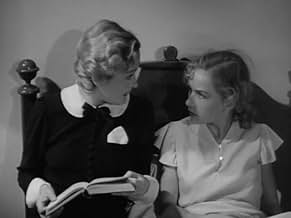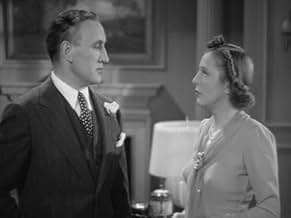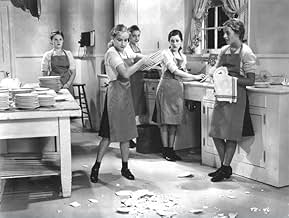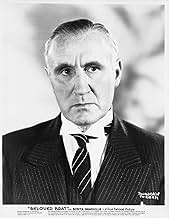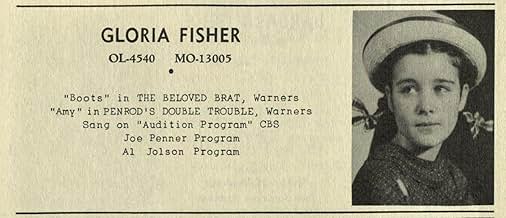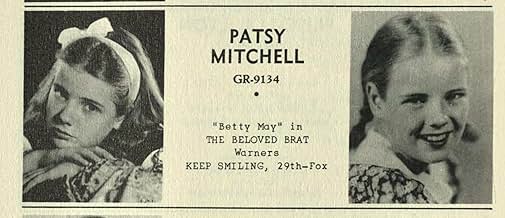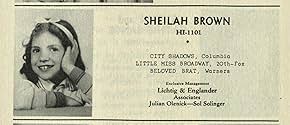Agrega una trama en tu idiomaDrama about a problem child and her problem parents.Drama about a problem child and her problem parents.Drama about a problem child and her problem parents.
- Dirección
- Guionistas
- Elenco
Lucile Gleason
- Miss Brewster
- (as Lucille Gleason)
Matthew 'Stymie' Beard
- Pinkie White
- (as Stymie Beard)
Gloria Fisher
- Boots
- (as Gloria Fischer)
Jessie Arnold
- Nurse
- (sin créditos)
Mary Avery
- Teacher
- (sin créditos)
- Dirección
- Guionistas
- Todo el elenco y el equipo
- Producción, taquilla y más en IMDbPro
Opiniones destacadas
A parental neglect social statement that comes dangerously close to the unintentional hilarity of "Reefer Madness". Fortunately it is saved by an extremely strong performance by Bonita Granville in the lead role (Roberta Morgan). While a bit of a reprise of her "These Three" nastiness, Granville's "The Beloved Brat" (1938) title role has considerably more dimensionality and the young actress displays unexpected range.
Granville was generally more cute than sexy, but this film has a pre-code feel to it and emphasizes her sensual side in several scenes. Donald Briggs of the pencil thin mustache plays her father's male secretary and they have a couple curious scenes together. These are certainly more interesting than his mildly romantic scenes with Dolores Costello who plays school principal Helen Morgan.
While the film might be of some interest to those focused on "Blacks in Hollywood", this is an extremely minor element within the film, artificially inserted just to lamely expand the "becoming a better person" theme.
Despite mostly weak supporting performances, Granville manages to sell her character and keeps a very unoriginal story quite involving. Fortunately she is in almost every scene. A must see for her fans.
Then again, what do I know? I'm only an inner child.
Granville was generally more cute than sexy, but this film has a pre-code feel to it and emphasizes her sensual side in several scenes. Donald Briggs of the pencil thin mustache plays her father's male secretary and they have a couple curious scenes together. These are certainly more interesting than his mildly romantic scenes with Dolores Costello who plays school principal Helen Morgan.
While the film might be of some interest to those focused on "Blacks in Hollywood", this is an extremely minor element within the film, artificially inserted just to lamely expand the "becoming a better person" theme.
Despite mostly weak supporting performances, Granville manages to sell her character and keeps a very unoriginal story quite involving. Fortunately she is in almost every scene. A must see for her fans.
Then again, what do I know? I'm only an inner child.
Roberta Morgan (Bonita Granville) has wealthy parents who don't care much about her. She is forced to give up a puppy for embarrassing her mother. She acts out against the household help. She befriends black siblings, Pinkie White and his sister Arabella. She is impressed with their loving family. She acts out more when Jenkins the butler kicks out her guest Pinkie.
I don't know the old time definition of brat. She's not really bratty in the modern sense for the first half hour. She's more a poor little rich girl. Of course, the fire is very bratty and the perjury is unforgiveable. In the end, Roberta is a conflicted character. The turns are abrupt. I would have preferred a simply runaway story and Pinkie can help her return home. The story leaves me a little unsatisfied. Leo Gorcey does have a good scene looking like his Dead End Kid. Granville is a fine young sassy actress. So I like the first half but the second half is not as compelling.
I don't know the old time definition of brat. She's not really bratty in the modern sense for the first half hour. She's more a poor little rich girl. Of course, the fire is very bratty and the perjury is unforgiveable. In the end, Roberta is a conflicted character. The turns are abrupt. I would have preferred a simply runaway story and Pinkie can help her return home. The story leaves me a little unsatisfied. Leo Gorcey does have a good scene looking like his Dead End Kid. Granville is a fine young sassy actress. So I like the first half but the second half is not as compelling.
In the title role, Bonita Granville appears about as lovable as she'd been two years earlier in "These Three." A brat: Yes. Beloved? Not really. Not by the audience and not by her family.
She gets into mischief of an increasingly serious nature. Her self-involved wealthy parents are given the option of sending her to a school that seems to be a step above reform school.
The luminous Dolores Costello is employed there. Oh, who can forget her heartbreaking performance a few years later in "The Magnificent Ambersons"? She's very good here too.
All the acting is at least decent and often more than that.
From the beginning we see that Granville's character is the monster she is because no one -- not even her parents' servants -- likes or pays real attention to her. It's far from a great movie but it's also better than one would expect.
She gets into mischief of an increasingly serious nature. Her self-involved wealthy parents are given the option of sending her to a school that seems to be a step above reform school.
The luminous Dolores Costello is employed there. Oh, who can forget her heartbreaking performance a few years later in "The Magnificent Ambersons"? She's very good here too.
All the acting is at least decent and often more than that.
From the beginning we see that Granville's character is the monster she is because no one -- not even her parents' servants -- likes or pays real attention to her. It's far from a great movie but it's also better than one would expect.
Bonita Granville, prior too 1938 plied her trade primarily at RKO with stints at other studios, like Paramount. For the most part her roles were of a obnoxious BRAT and not a very sympathetic character. Sometimes mildly irritating, like in CALVACADE (1933) FOX, often a real pain in the ass as in THESE THREE (1936) RKO or MAID OF SALEM (1937) PARAMOUNT. In late 1937 she was contracted by Warner Brothers (WB) and her career took a decisive turn.
THE BELOVED BRAT (1938) WB, clearly showed this change of pace. Bonita played a young Girl who is ignored by her business obsessed Father and a Mother more interested in 'bridge clubs' and local social exercises then her parental obligations. The first is somewhat excusable, the latter not at all. Though fifth-teen (15) at the time Bonita plays her character younger then her years, but gets it across very well. Her tribulations take her from confused and defiant adolescent to responsible young person. Ending with love and understanding for all.
Ms. Granville is supported by a competent script and cast. It was refreshing to see Black-Americans portrayed as Friends and not simple minded lackey's. At the WB and other studios they were often portrayed in a stereotypical way, particularly in the films of Bette Davis. She also has the advantage of Donald Crisp (was he ever young?) as her Father. I have never seen Mr. Crisp phone in a role, he is a professional every time. Silent Star, Doleros Costello, the former Mrs. John Barrymore (Drew's Grand-Mother) also delivers the goods. Still a delicate beauty and showing a effortless acting style.
Ms. Granville would work at the WB till the early 1940s' then moving on to MGM with occasional loan-outs. In all of her films she would bring her competent abilities and mature into a attractive actress. She knew when the 'gig' was up, married well (multi-million$ & oil) and became a Producer of LASSIE (T.V.)! This Women really had her head screwed on straight, dieing rather young at Sixty-Five (65).
THE BELOVED BRAT (1938) WB, clearly showed this change of pace. Bonita played a young Girl who is ignored by her business obsessed Father and a Mother more interested in 'bridge clubs' and local social exercises then her parental obligations. The first is somewhat excusable, the latter not at all. Though fifth-teen (15) at the time Bonita plays her character younger then her years, but gets it across very well. Her tribulations take her from confused and defiant adolescent to responsible young person. Ending with love and understanding for all.
Ms. Granville is supported by a competent script and cast. It was refreshing to see Black-Americans portrayed as Friends and not simple minded lackey's. At the WB and other studios they were often portrayed in a stereotypical way, particularly in the films of Bette Davis. She also has the advantage of Donald Crisp (was he ever young?) as her Father. I have never seen Mr. Crisp phone in a role, he is a professional every time. Silent Star, Doleros Costello, the former Mrs. John Barrymore (Drew's Grand-Mother) also delivers the goods. Still a delicate beauty and showing a effortless acting style.
Ms. Granville would work at the WB till the early 1940s' then moving on to MGM with occasional loan-outs. In all of her films she would bring her competent abilities and mature into a attractive actress. She knew when the 'gig' was up, married well (multi-million$ & oil) and became a Producer of LASSIE (T.V.)! This Women really had her head screwed on straight, dieing rather young at Sixty-Five (65).
BONITA GRANVILLE specialized in playing brattish kid sister roles throughout most of the '30s (when she wasn't playing Nancy Drew), and this is one of her more insufferable roles as a rich brat given to tossing dinner trays out the window when in a huff.
She plays the neglected daughter of DONALD CRISP, only instead of pouting the way Shirley Temple would do under these "dire" circumstances, Bonita takes a feistier approach, talking back to the house servants and refusing to eat her spinach with much more vehemence than Shirley ever showed.
She befriends a black boy, only because he promises to teach her how to use his rifle. LEO GORCEY turns up as another unlikely companion for the poor little rich girl and from then on the film becomes pretty unwatchable as Bonita is taught a thing or two about changing her snobbish ways.
By the time the plot gets any thicker, Bonita has totally lost the patience of her parents as well as the viewer. Too bad Warner Bros. couldn't come up with better scripts for their child star instead of casting her in these insipid programmers that are enough to wear anyone's patience.
Any resemblance to the real world is purely coincidental.
Trivia note: The script was written by Jean Negulesco, who later made a much better director than screenwriter.
She plays the neglected daughter of DONALD CRISP, only instead of pouting the way Shirley Temple would do under these "dire" circumstances, Bonita takes a feistier approach, talking back to the house servants and refusing to eat her spinach with much more vehemence than Shirley ever showed.
She befriends a black boy, only because he promises to teach her how to use his rifle. LEO GORCEY turns up as another unlikely companion for the poor little rich girl and from then on the film becomes pretty unwatchable as Bonita is taught a thing or two about changing her snobbish ways.
By the time the plot gets any thicker, Bonita has totally lost the patience of her parents as well as the viewer. Too bad Warner Bros. couldn't come up with better scripts for their child star instead of casting her in these insipid programmers that are enough to wear anyone's patience.
Any resemblance to the real world is purely coincidental.
Trivia note: The script was written by Jean Negulesco, who later made a much better director than screenwriter.
¿Sabías que…?
- TriviaThe $50 Roberta receives from her father as a birthday present would equate to over $900 in 2019.
- ErroresIn two consecutive scenes between Donald Briggs and Dolores Costello, one interior and then exterior, first the shadow of the mike and then the mike and boom can be seen.
- ConexionesFeatured in Jack Wrather: A Legacy of Film and Friendship (2022)
Selecciones populares
Inicia sesión para calificar y agrega a la lista de videos para obtener recomendaciones personalizadas
Detalles
- Tiempo de ejecución1 hora 2 minutos
- Color
- Mezcla de sonido
- Relación de aspecto
- 1.37 : 1
Contribuir a esta página
Sugiere una edición o agrega el contenido que falta

Principales brechas de datos
By what name was The Beloved Brat (1938) officially released in Canada in English?
Responda
